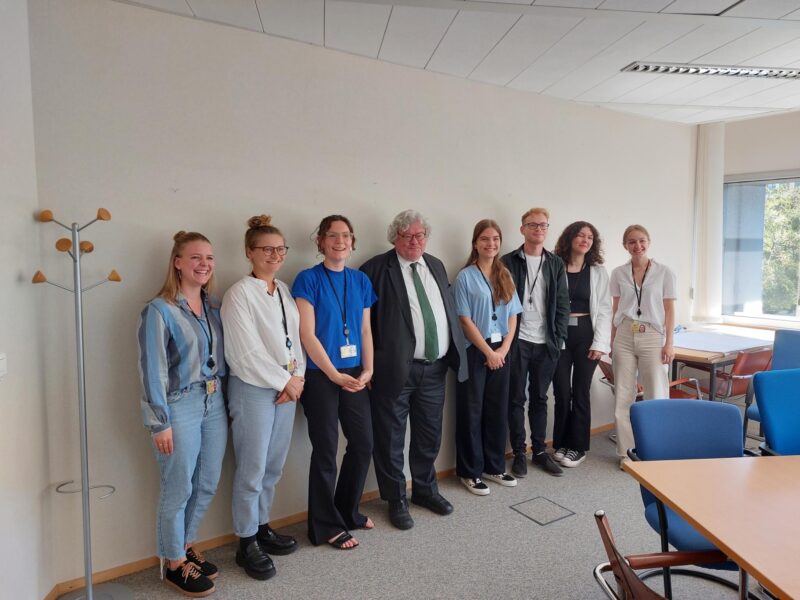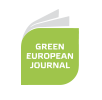In dieser Woche besteht die Bütis Woche aus meinen Abschlussbemerkungen von einer Konferenz, die ich am 7. September im Europäischen Parlament veranstaltet habe. Die Konferenz, die auf Englisch stattfand, trug den Titel: “THE NEW NORMAL OF EUROPEAN SECURITY” und das Video davon ist hier online zu finden.
Dear participants, ladies and gentlemen,
in concluding, let me begin by emphasizing how very, very grateful I am to our keynote speaker, Pekka Haavisto, and to all our panelists and moderators. I’m really overwhelmed. We have enjoyed an exceptionally rich half day. I feel enlightened, and I’m sure many of you will also. So, again, great thanks to all the people who contributed.
We foresaw, that my friend and colleague Ernest Urtasun from Spain would say concluding words. Unfortunately, he can’t be here, because he’s negotiating over the next government of Spain. And as you will all know, there are some very difficult negotiations going on with certain people residing in Belgium at the time. So it falls upon me to make some summarizing remarks.
Let me start by stating what has become so obvious again during the last few hours: What we Europeans see as challenges to Europe, the elements of this demanding new normal, which is undermining, threatening, putting into question the order, that we had grown accustomed to, that may look very different for people elsewhere on the globe. They see the undermining of a reality, that had never seemed like much of a beneficial order to many of them, had rather looked like chaos or even oppression. And the change that we have to cope with as Europeans is also driven by the desire of some of the other actors to effect change in order to benefit more from the international system. When we take note of what we just saw with BRICS for instance or some other developments, I think we cannot ignore how powerful that ambition is to transform international relations.
We can be happy that we did not make the mistake today of looking at all of this through the lens of either China baiting or China accommodating, but obviously, what China does, is that they understand well the appetite for change, and they offer themselves as the agent of change. They basically tell other countries: “Look, we’re breaking the ceiling and we’re not breaking it just for ourselves, but for everybody. Once we rise, you can rise in the wake.” I believe, that we as Europeans have to understand: if we are just sitting back and defending, trying to defend, what we used to enjoy and do not understand how we have to partner with others, then we’re not providing a satisfactory alternative and important parts of the world will turn their backs towards us and seek greener pastures elsewhere.
Second point. I think indeed we need to rejuvenate multilateralism or, as Pierre (Vimont, Ambassadeur de France, Carnegie Europe) put it, to rekindle multilateralism. I’m not saying that we should claim the drivers seat for us plus the right to pick the fellow travelers. But I would claim that we should seek co-responsibility for that effort, because multilateralism conforms well with the guiding principles of the European Union. The European Union has grown strong on the basis of the principles of integrating, sharing, connecting and not of de-coupling or building walls. What we endeavored to do with the European integration project, that should also guide our international relations. People, that have followed what I do, will know what I’m gonna say now: Instead of advocating strategic autonomy as the guiding principle for Europe, I think we should rather advocate strategic solidarity with partners, which does of course not give up on the necessity to have sovereignty also. In addition, we have to reckon with the past that is still not over and that’s the past of imperialism and colonialism and when we criticize imperialism today, we cannot ignore the history of which we’re such a big part.
We also have to reassure our public about the direction of Europe’s international relations. We must not talk past the people. The security discourse will be at the core, at the center, of what people expect, and unless we are capable of showing that the European Union can be, indeed is, at the center of delivering in that regard, we’re failing our citizens and losing their support.
And we will have to answer the question that arose in one of our panels: “Which side are you on?” I believe there’s not just one answer to that question because there’s not just one front, where you have to choose. As far as it is a choice between authoritarianism and democracy, it’s easy to say which side we’re on. But where the choice is between ignoring colonial baggage or demonstrating post-colonial pretense on one hand or sharing and solidarity on the other, one can ask whether we are equally clear. Not seeing that second challenge, would be fateful. For a long time, many of us, including, I’m sure, many of you in the room, have advocated for more global justice on the basis of ethical principles. Today we are forced to move beyond ethics. It’s become a geopolitical necessity for the European Union to embrace the principle of global justice and that includes creating new balances in international institutions, as we’ve learned. Only if we do that, can we rein in tendencies towards a bilateral hegemonic battle between two superpowers. Unless we, for instance, deal with the issues of financial imbalances motivating the de-dollarisation conversation, we might effectively play into the hands of a tendency of de-dollarisation. Where we don’t offer adequate answers, the request for change will radicalize. That’s the case domestically and internationally.
I do think, that we’ve heard a lot today about where we can be active and shape an active European agenda. We’ve heard, that we have to be open for new coalitions, to diversify. Pekka told us in clear words, that peace does not preserve itself and that the concept of deterrence has to be part of our approach more than we have been accustomed. That is, by the way, not just the case in our relationship with Russia.
Security policy – that’s also one lesson that I take from our conversations – security policy will be at the center of the EU agenda for the long haul. But, and I pick up what you said, Romana (Vlahutin, German Marshall Fund): our capabilities and our capacities don’t match. The so-called silver bullet Qualified Majority Voting on foreign policy, it’s not a silver bullet. It is a distraction. We need a new mindset and the willingness to act instead of just being satisfied with pretending to act. We heard good ideas about how we could possibly help reinventing the OSCE and its future role. We did not hear that much about enlargement, but I would argue that enlargement should be a dimension of our security policy where we have to be courageous. Why not have a controversy in next year’s electoral campaigns over whether Europe is willing to jump into the cold water and to state that we want to finalize enlargement by 2030?
Finally, we have heard about internal improvements within our Union, that we have to discuss. Most of all: pooling our efforts and our capabilities. We have heard also, and I remind everybody of what Guntram (Woff, German Council on Foreign Relations) said in the first panel: Don’t throw out the baby with the bathwater on economic or trade multilateralism. No to a promotion of protectionism that comes under the disguise of broad industrial policy.
Let me sum up: The challenges are not small, but I don’t come away from this conversation with the impression that we have to be destitute, that we have to give up on hope. But we can only build our hope on the basis of partnership with others, that are willing to build their hope on partnership with us. In that regard I think what you said, ambassador Kimani, about our neighboring continent Africa and the European Union and the partnership that we could have for instance with regard to climate change, was extremely important for us as a learning opportunity. The Global Gateway Initiative must be part of our answer.
I do feel encouraged by our discussions today, and I do hope so will you. Thanks to everybody again, and have a good day.
(Text edited somewhat.)
SONST NOCH
Am Dienstag habe ich eine Besuchergruppe von jungen JournalistInnen eines Lehrredaktions-Formats in Brüssel empfangen.

Meine Presseerklärung zum Treffen des NATO-Generalsekretärs, Jens Stoltenberg mit der Präsidentin des Kosovo am Donnerstag.
Am Mittwoch sprach ich bei einem Webinar der Asienbrücke zum Thema “Deutschlands China-Strategie”.
In der nächsten Woche findet die erste Plenarwoche nach der Sommerpause in Straßburg statt. Hier geht es zur regelmäßig aktualisierten Tagesordnung.
Am 13.09 findet ein gemeinsames Treffen der China-Delegation und der US-Delegation des Europäischen Parlaments statt. Dort tauschen wir uns mit den beiden Experten, Ryan Hass (Brookings Institution) und Jude Blanchette (Center of Strategic and International Studies) aus.
Außerdem nehme ich von Donnerstag, den 14.09 bis Freitag den 15.09 an einer Delegationsreise des Ausschuss für internationalen Handel (INTA) am WTO Public Forum in Genf teil.


















